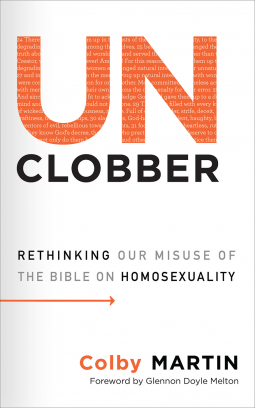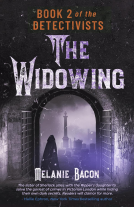
UnClobber
Rethinking Our Misuse of the Bible on Homosexuality
by Colby Martin
This title was previously available on NetGalley and is now archived.
Send NetGalley books directly to your Kindle or Kindle app
1
To read on a Kindle or Kindle app, please add kindle@netgalley.com as an approved email address to receive files in your Amazon account. Click here for step-by-step instructions.
2
Also find your Kindle email address within your Amazon account, and enter it here.
Pub Date Sep 28 2016 | Archive Date Oct 04 2017
Description
Churches in America are experiencing an unprecedented fracturing due to their belief and attitude toward the LGBTQ community. Armed with only six passages in the Bible--often known as the "clobber passages"--the traditional Christian position has been one that stands against the full inclusion of our LGBTQ brothers and sisters. Unclobber reexamines each of those frequently quoted passages of Scripture, alternating with author Colby Martin's own story of being fired from an evangelical megachurch when they discovered his stance on sexuality.
UnClobber reexamines what the Bible says (and does not say) about homosexuality in such a way that breathes fresh life into outdated and inaccurate assumptions and interpretations.
Available Editions
| EDITION | Other Format |
| ISBN | 9780664262211 |
| PRICE | $18.00 (USD) |
Average rating from 27 members
Featured Reviews
 Allyson W, Reviewer
Allyson W, Reviewer
In 2005 Colby Martin, a newly minted evangelical pastor, started experiencing an inner tension when it came to matters of homosexuality. He is not gay himself, nor did he have a relative or close friend who was gay—the typical impetus to explore what the Bible says about homosexuality. Rather, he is straight, married, and the father of four. A Facebook posting prompted by the repeal of the “don’t ask don’t tell” policy triggered a series of events resulting in the loss of his pastoral position.
While unemployment brought its own set of anxieties, Colby now felt for the first time that his beliefs were in alignment with his public persona. He no longer had to hide his misgivings about the theologically conservative interpretation of what he dubs the “clobber” passages: Genesis 19; Leviticus 18:22; 20:13; Romans 1:26-27; 1 Corinthians 6:9; and 1 Timothy 1:10.
The book could easily drift into a dry, word-by-word parsing of an ancient religious text. Instead, Colby intersperses the chapters discussing Bible passages with chapters narrating his personal journey -- both spiritual and professional -- through this difficult topic. The result is a blend of memoir and biblical exposition, which keeps the reader from getting bogged down in either format.
The book bears some similarity to Matthew Vines’ God and the Gay Christian, which came out two years earlier. Where do the books differ? Whereas some might dismiss Matthew Vines as perhaps having bias in his exegesis (i.e. as a gay man, he will interpret scripture to get his preferred result), the same cannot be said of Colby Martin. He has no dog in the fight. He claims to have changed his views based on academic integrity and “doing my best to follow where Christ was leading me.” And it cost him career-wise and economically in the short term. After a brief stint in a progressive church, Colby and his wife, Kate, started their own church called Sojourn Grace Collective in San Diego.
Like Vines, Colby Martin wrestles with the biblical text, considering the ancient Hebrew cultural context of the Old Testament and the Roman world of the New. Some arguments are persuasive; others seem to be more of a stretch. There are no quick, easy answers to this subject, which is causing much division within the Christian community. Regardless of where the reader finds him or herself in the debate, a grasp of the key passages, and the various ways they have been interpreted over the years, will hopefully lead to better understanding.
Readers who liked this book also liked:
Marie Bostwick
Historical Fiction, Literary Fiction, Women's Fiction


















